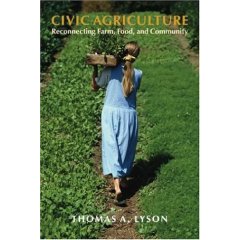Briefly Noted: "Civic Agriculture"
 "Civic agriculture", a phrase coined by Cornell University's Thomas Lyson, refers to "the rebirth of locally based agriculture and food production." (1)
"Civic agriculture", a phrase coined by Cornell University's Thomas Lyson, refers to "the rebirth of locally based agriculture and food production." (1)It's also the title of his 2004 book, Civic Agriculture: Reconnecting Farm, Food and Community. Professor Lyson argues for a civic agriculture that would "embod[y] a commitment to developing and strengthening an economically, environmentally, and socially sustainable system of agriculture and food production that relies on local resources and serves local markets and consumers." (63)
As Lyson tells it, civic agriculture has the following characteristics, nicely set out in table form at page 85:
"(1) Farming is oriented toward local markets that serve local consumers rather than national or international mass markets.
(2) Agriculture is seen as an integral part of rural communities, not merely as production of commodities.
(3) Farmers are concerned more with high quality and value-added products and less with quantity (yield) and least-cost production practices.
(4) Production at the farm level is often more labor-intensive and land-intensive and less capital-intensive and land-extensive. Farm enterprises tend to be considerably smaller in scale and scope than industrial producers.
(5) Producers more often rely on local, site-specific knowledge and less on a uniform set of "best management practices."
(6) Producers forge direct market links to consumers rather than indirect links through middlemen (wholesalers, brokers, processors, etc.)." (85, T. 6.1)
In making his case for a role for civic agriculture Lyson sketches the rise of modern agriculture, deftly, if somewhat superficially, explaining how we got here (and where, in fact, "here" is). He convincingly outlines the problems of a too-consolidated food industry, and makes a case for a role for agriculture in rural redevelopment.
Lyson makes a compelling argument for some sort of civic (alternative, sustainable, local) agriculture. This reader, however, wishes the ideas and claims set forth in "Civic Agriculture" were more developed. For example, Lyson argues for a place for sustainable agriculture in our food supply, but gives us few clues as to just how that place will be made, or how extensive that place should or even could be. How exactly we can achieve a civic agriculture is also a question Lyson addresses, but does not entirely answer.
Despite this criticism, Lyson has produced a thought-provoking, accessible piece.
Editors' note: This is the first in an occasional series of brief reviews of books or articles of interest to the agriculture law community. Contact the authors to bring to our attention a noteworthy piece.










1 Comments:
if we are to take Romm and Tobis at their word–that it is a huge moral failing not to act on man-made climate change, then I don’t understand why they are so reluctant to argue just as strenously for climate adaptation,
Post a Comment
<< Home